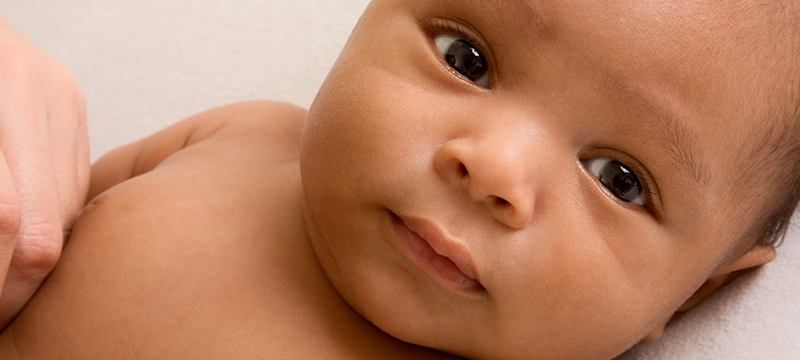May is Better Hearing and Speech Month, an opportunity for the American Speech-Language-Hearing Association (ASHA) and other health care organizations to raise awareness about communication disorders and the importance of early newborn hearing diagnosis and intervention.
Hearing loss is among these disorders and babies can be born with it. According to the American Academy of Pediatrics, three out of every 1,000 babies are born with some degree of hearing loss, making hearing loss one of the most common birth defects.
Because hearing loss can affect baby’s ability to develop normal speech and language, early detection is critical.
Here are five things you may not know about newborn hearing health:
A newborn hearing screen and a diagnostic hearing evaluation are different.
A newborn hearing screen (completed at birth or prior to hospital discharge) can help identify babies with hearing loss or those at risk. If a baby does not pass a newborn hearing screen, it is important that he or she have a diagnostic hearing evaluation.
A diagnostic hearing evaluation is a more in depth assessment performed by an audiologist. A diagnostic hearing evaluation can confirm or rule out hearing loss. It should be completed by the time a baby is three months old.
If hearing loss is confirmed, intervention should begin by the time a baby is six months old.
Not all newborn hearing screening methods are the same.
Automated auditory brainstem response (AABR) and otoacoustic emissions (OAE) are two different screening methods. While both are safe and comfortable for the baby, the tests differ in their ability to detect certain types of hearing losses.
OAE screens evaluate cochlear (inner ear) function. AABR screens evaluate both the inner ear and brain response to sound.
If a baby does not pass an OAE screen, the Joint Committee on Infant Hearing recommends a follow-up screen using AABR technology. If a baby does not pass an AABR screen, a baby should receive another AABR screen or see an audiologist for a diagnostic hearing evaluation.
To learn more about the differences between the two screening methods, visit the Centers for Disease Control and Prevention.
Newborn hearing screen is the law in almost every state.
In 47 states, hospitals must offer a newborn hearing screen to all babies, ideally before discharge from the hospital. The number of states with mandates has grown along with the awareness of the importance of early detection and intervention.
A baby can be fit for hearing aids as early as one month of age.
Because treatment can begin at such a young age, early detection of hearing loss is vitally important. Early detection of hearing loss provides a unique opportunity for newborns to receive early intervention that may dramatically increase their quality of life. Several studies have shown that a baby whose hearing loss is diagnosed and treated before six months of age is more likely to achieve age-related speech and language milestones.
Hearing health can change.
Even if a baby passes the newborn hearing screen, hearing health can change. Hearing loss can develop months or even years later. If your baby does not meet the age-related speech/language development milestones below, talk to your baby’s doctor about another hearing screen.
- At 0-3 months, jumps at loud, sudden noises and calms down when you speak
- At 3-6 months, turns head or moves eyes to find your voice, plays by making sounds and knows familiar sounds for feeding (spoon in a dish)
- At 6-10 months, reacts to hearing own name, begins to understand easy words like “no,” “bye-bye” and “night-night,” responds to music by cooing»» Shows
- At 10-15 months, repeats simple words and sounds you make, uses 2-3 words other than “ma-ma” or “da-da,” knows names of toys and can point to them
- At 15-24 months, follows simple spoken directions, uses 10 or more real words, points to body parts when asked, enjoys being read to, refers to self by name, shows interest in sounds of radio and TV
As Better Hearing and Speech Month is underway, MEDNAX would like to recognize the efforts of the Newborn Hearing Screen Team, hospital partners, pediatricians, audiologists and the early intervention community – all of whom play a critical role in the early detection of children with hearing loss. MEDNAX is one of the nation’s largest providers of newborn hearing screen programs, partnering with more than 400 hospitals across the country.
